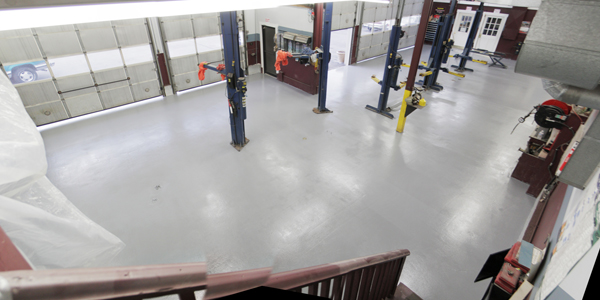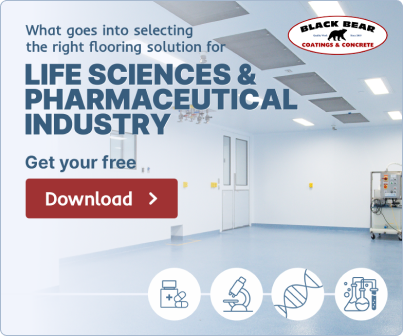
When you’re looking for flooring solutions for your workspace, particularly if you work in a highly-regulated industry such as food preparation or pharmaceuticals, few options are better than resin-coated concrete floors. When concrete flooring is coated with a material like urethane or epoxy it creates an extremely hard and durable surface which is also easy to clean. This makes it much simpler to stay within regulations from government bodies like the Food and Drug Administration (FDA).
The big question is what type of coating is best for your floor. Urethane and epoxy coatings are the two most common and popular choices, and each has their own strengths and weaknesses. So in this article, we’ll be breaking down the options based on a variety of criteria.
Epoxy Floor Coatings
Epoxy is a thermosetting polymer that comes in 3 different formulations. It can be water-based, solvent-based, or fully solid. Epoxy coatings typically bind tightly to the floor and provide a hard and durable coating. Industrial floors that experience heavy traffic and impact from machinery will benefit from the durability and shock-absorbing properties of epoxy coatings.
Epoxy flooring can also be formulated to be extra resistant to chemical stains and moisture, making it a useful coating for factory floors and similar establishments. In addition, epoxy is an excellent coating material for resurfacing and renovating older floors.
The biggest drawback with epoxy coatings is the installation time. The floor has to be thoroughly prepped to prevent the epoxy from adhering loosely to the intended surface. Once applied the curing time may take longer than other materials. Epoxy commercial coatings also tend to wear over time when exposed to direct sunlight which may be a factor when engineering a solution for a specific, light-filled space.
Urethane Floor Coatings
Urethane is also a thermosetting polymer that is used to coat concrete floors. It is one of the highest performing commercial coatings because it is durable and flexible in its application. Urethane comes in various formulations that differ in their fluidity. The higher the solid content in the mixture, the higher the performance of the coating.
Urethane coatings are also more resistant to abrasions (such as drops-and-scratches) as well as UV light. In fact, they don’t yellow out over-time like epoxy coatings do. They are better at retaining color and sheen, keeping the floors looking newer for longer. The prep process for applying urethane coatings is considerably shorter than epoxy coatings as well. This is a critical decision maker when time is of the essence.
The primary drawback with urethane vs epoxy commercial coatings is that urethane may not bond as tightly to concrete as epoxy does. Urethane has a thin surface film that makes it harder to apply to small cracks and similar surfaces.
Epoxy Coatings vs Urethane Coatings – Which Is The Best Choice For Your Business’ Flooring?
Floor Coating Pricing
Price is not typically a major factor. Both epoxy and urethane coatings are affordable to implement when building or renovating a working space, and the costs are similar as well. Urethane tends to be slightly more expensive than epoxy, but not by enough that it’s likely to strongly influence your decision.
Epoxy vs Urethane Coating Strength
Urethane and epoxy are both quite strong, but in slightly different ways. Epoxy is physically stronger, and is more resistant to crushing forces – such as being driven on by heavy vehicles. So epoxy coating is a good choice for spaces which will see a lot of heavy traffic. However, it is brittle, and can be cracked by falling objects, especially those with sharp points or corners.
Urethane floor coating is not quite as resistant to downward pressure, but being rubbery, it’s more resilient against falling damage. It’s also more heat resistant, whereas sufficiently hot temperatures can weaken epoxy.
Floor Coating Installation Time
Both urethane and epoxy will take some time to install. The concrete floor must be prepped, which includes thoroughly cleaning it of any impurities, then allowing it to dry completely before the surface coating is applied. Then the coating will need substantial time to fully harden and cure.
Urethane dries and cures faster than epoxy, but installation will take at least two days in either case. However, epoxy can sometimes require three days to dry before it can be usable. In addition, epoxy is more sensitive to humidity and moisture. Even small amounts of moisture can slow down the drying process.
Chemical Resistance of Epoxy vs Urethane Flooring
If chemical spills are a significant concern, epoxy will probably be the better option. It’s more resistant to both acids and bases than urethane. Frequent spills of almost any caustic material will weaken urethane cement flooring.
Also, epoxy coatings can be mixed to include chemicals that give it extra chemical resistance against particular types of spills, if that seems likely to happen.
Flooring Cleanliness and Microbial Resistance
Both urethane and epoxy provide excellent surfaces that are easy to keep clean. Because they are spread across the entire floor, they create a seamless edge-to-edge surface that perfectly conforms to the topography of your floor – including any structural features such as support columns. There are no cracks or seams that give mold, mildew, or other microbes a chance to take hold, and the floors are easily cleaned with basic techniques.
Epoxy can be mixed with other additives, such as silver, which enhance its anti-microbial properties. This makes it typically the better choice for FDA- or USDA-regulated facilities that require high degrees of cleanliness, as well as for scientific laboratories and the like.
Ultraviolet (UV) Resistance
Urethane floor coating is the clear winner here. Epoxy will fade and lose its color quickly when in direct sunlight, and constant shifts in temperature – like going in and out of sunlight – can weaken it. Meanwhile, urethane is almost entirely unaffected by UV light. This makes urethane the preferred choice for applications such as entry foyers in large buildings with many windows.
Coating Texture and Traction
Despite creating a shiny surface due to high light reflectivity, both urethane and epoxy are safe to walk on in normal circumstances, with plenty of traction.
However, epoxy tends to become very slippery when wet, which can present a tripping hazard. In some cases, this may even violate OSHA safety guidelines. It is important to select the right material for your use case, whether it be for an industrial facility or commercial floors.
It is possible to add materials to epoxy – like sand – which increase its grip. However, additives for non-slip flooring also increases the cost. Overall, urethane is a better option for non slip surfaces when non-caustic spills are expected, such as in grocery stores.
Visual Appeal
Basic epoxy and urethane both create similar shiny floor surfaces. However, if beauty is your goal, metallic epoxy flooring can do it better.
Metallic particles can be added to epoxy to create eye-catching swirls with a lot of dimensionality. That said, urethane can come in a variety of colors as well.
Epoxy vs Urethane Concrete Floor Installation
Ultimately, the choice between epoxy vs urethane coatings is a trade-off between tight adherence to the floors-and-high-abrasive resistance. If you’re also concerned about UV durability, ease of application, and resistance to water/chemical stains, you may be driven towards selecting one option over another.
There’s no simple answer to the question of whether epoxy or urethane is “better.” The right floor is customized to the environment yet both seamless solutions will offer a longer-lasting floor system.
Work with a Professional Concrete Flooring Contractor for Best Results
Black Bear Coatings & Concrete has extensive knowledge of resinous coatings for commercial and industrial environments.
With over 30 years of combined experience, our crews have the skills required to create a floor that meets each client’s unique maintenance and aesthetic needs. We take the time to assess each client’s needs, identify the best flooring solution, engage in surface prep and install the right floor using best practices and innovative techniques. Contact us for a free on-site assessment to learn how your company can benefit from the best epoxy and urethane floor solutions.



